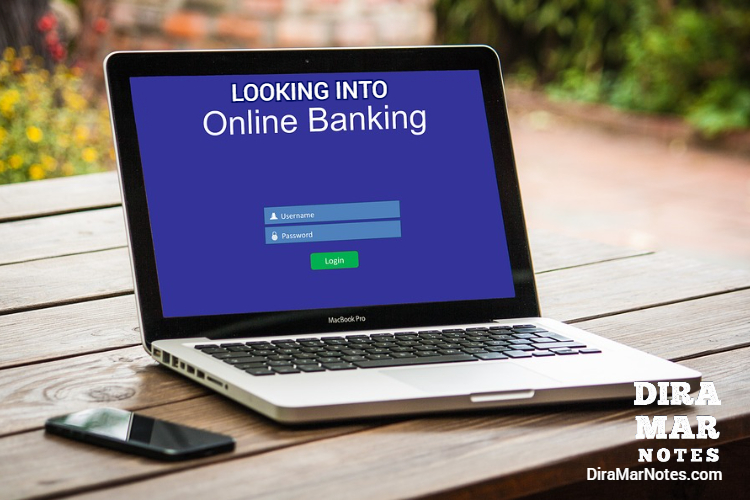
LOOKING INTO ONLINE BANKING
Online Banking is the convenient process of conducting financial transactions over the internet instead of physically going into the bank.
These days, it’s also known as Internet Banking or e-banking. Online Banking allows the customer to access all banking information from a Smartphone, Tablet, Laptop, or PC, which means that you no longer are required to go to the bank for any basic banking service. In other words, it eliminates the need for customers to visit banks and make long queues to access most financial services.
ONLINE BANKING SERVICES
Today most banks now offer their services online. In order to have access to the services, the bank prompted users to create accounts on their websites. Once they’re logged in, they will have access to most of the banking services including:
- Depositing and withdrawing money
- Checking the account balance
- Applying for quick loans
- Make money transfers
- Check bank statements
- Pay bills online, e.g., electricity and water bills
- Reporting changes on personal information, e.g., address
With online banking, the customer can also monitor the status of their loans for approval. However, some transactions, such as applying for mortgages, demand traditional face-to-face interactions. These assist the bank representatives to confirm that the applicants are actually real people. A customer’s needs are a smartphone or laptop, good internet, and a bank account to make use of the services. It’s easy, fast, and reliable (for the most part).
Most banks also emphasize the utilization of a two-step factor security authentication when the users log in to their accounts. This helps verify that only the owner of the account is authorized to make any changes or transactions. Besides convenience, most new online banking providers don’t charge for most of their services, which is great for users. Unlike traditional banks that usually add a service charge left and right.
BENEFITS OF ONLINE BANKING
– IT’S VERY CONVENIENT
The traditional banking model is simply tiresome. Customers must make their way to banks and waste a lot of time to obtain what they want tiresome. Online banking saves customers from all this waste of time by providing these very services directly to them. The 24/7 account services mean that users can get their money anytime they need it directly from the bank’s website or the bank app. It’s also a lifesaver in case of emergencies.
– FAST AND RELIABLE
Online banking has eliminated the risk of losing your monthly statement getting lost in the mail or waiting for hours to apply for a loan or a new credit card. Customers can now very quickly log in to their accounts and get most of their services processed quickly. Transfer of funds has also become instantaneous, cutting down all the major unnecessary processes.
– BETTER CONTROL AND ACCESS TO YOUR ACCOUNT
Online banking offers 24/7 access to your account. You can, therefore, monitor every transaction happening in the account, and spot irregularities earlier on. Access to your account also helps you plan your finances and expenses to increase your savings.
– IT’S CHEAPER
With online banking, you will find cheaper rates offered by new online banks compared to traditional banks. In most cases, you won’t have to pay a fee to check your bank account balance or access some bank services. Since online banks also don’t incur overhead costs of electricity, water, or rent, they subsequently have the ability to provide lower fees for most of their services.
CHALLENGES OF ONLINE BANKING
– TECHNOLOGY ISSUES
Connectivity may not always be strong in places with weak internet infrastructure, which leads to service interruptions. Furthermore, your access to your account is limited to your internet connections. If your internet is slow, you may not have easy access to the account. Online banking also proves to be difficult for users new to internet transactions like the elderly.
You also have cases where banks continued using their legacy systems, and simply added an online portal on top. The problem with this is that the old systems, like mainframe computers from the 1970s, are more prone to cyber-attacks compared to the latest technology.
– CYBER SECURITY ISSUES
The internet can be a dangerous place if you are not careful with your data. By exposing all your financial details online like saving them on the cloud or archiving them in your emails, you put yourself at more risk. Online banking exposes you to hacking, identity thefts, phishing /spam emails, or calls. Even as online banks try to advance and strengthen their security features, this threat is still very real. On the customer’s end, they are at risk of becoming victims of phishing emails, online scams, etc
Also, the fact that your information may be distributed across multiple devices puts your banking at more risk. For example, the security measures you put on your laptop like antivirus, firewalls, etc., are not by any means at the same level as those on your phone. Yet, many people use their phones as their personal computers for information storage and rely on app security measures. But the reality is that most apps are far from being secure. Furthermore, many apps gather your information for commercial use with your permission whether you realize it or not. Have you ever read the terms & conditions when you download an app? Or do you quickly click “accept” to immediately start using it?
In economies where fiat money is still part of the payment cycle, most online banks would have to have ATMs available for money deposits and/or a physical local branch. The reality is that in these economies it is more secure to go into the bank to deposit money than to deposit it at an ATM. The risk of getting robbed, especially for the elderly, remains high not to mention the high risk they face of getting scammed via emails or phone calls.
– LIMITED FLEXIBILITY WITH TRANSACTIONS
While online banking is convenient, it’s still limited in offering only basic services. For instance, the process of depositing monies for most online banks can be tiresome for the regular customer. Furthermore, most online banks pose a daily/monthly transaction limit for your account. This may force you to go back to the bank once you exceed this limit and may also have extra transaction costs for you to pay.
– OUTDATED BUSINESS PROCESSES
There are instances where you see traditional banks going digital without renewing their paper-based business processes. In some cases, the online portal is used as read-only where the user can see information but is not able to interact directly with the bank by sending completed application forms, asking questions, or simply updating personal information. In the end, the user must still go to the local branch to sign forms and get the answers needed. What is the point of having an online portal if you are not going to use its full potential?
– LIMITED ACCESSIBILITY
The reality is that not but not everyone has access to adequate internet for online banking from low-income families to those living in rural areas, accessibility to the internet remains a challenge. Ther is also the issue of quality of service. In places where you only have one internet provider the possibility of having low quality and poor service is high since there is no competition. This limits the use of the service for internet banking. Unless regulators set a quality level standard for internet service and/or make it an essential service like water, electricity, and gas limited access will remain an issue.
FINAL THOUGHTS
Online Banking is convenient and has its benefits but we must be aware of the challenges it brings as well such as the connectivity issue, especially in rural communities, unstable internet connections, and the cyber security issue especially for the elderly but also people in general. Everyone can become a victim and should know what to do when the time comes. There are a lot of security measures that people should be aware of before they decide to use online banking. At least it is a little bit more secure in a sense than mobile banking.
REFERENCES
Ashford, K. July 29, 2020. Best Online Banks Of 2020–And How To Choose One. Forbes.
Frankenfield, J. May 4, 2020. What is Online Banking? Investopedia.
Gara, A., June 8, 2020. The World’s Best Banks: The Future Of Banking Is Digital After Coronavirus. Forbes.
Pritchard, J. May 26, 2020. What is Online Banking? The Balance.
Tapscott, D., and Tapscott, A. 2016. Blockchain Revolution: How the Technology Behind Bitcoin is Changing Money, Business, and the World. Audiobook. Brilliance Audio. ISBN: 9781511357692




I agree that it is convenient but it also has become a dangerous tool. Australia and Canada are just testing grounds. Slowly you will see other wealthy nations do the same. If I have the wrong opinion, there is a high risk that I could get blocked from my accounts. Digital business is unreliable if you don’t have good internet instrastructure and enough energy for all your devices. In places where they have digitized Like Africa and India you see the consequences on the elderly and the poor that can’t keep up due to lack of knowledge and resources. Or simply can’t keep up with all the demands from the bank to open an account. Farmers go days without food because they can’t get paid.
Hi Jane,
Thanks for sharing your views. It is indeed problematic.
What is the point of online banking when the internal processes are still old school? In 2022 I still need to go to the bank to sign a bunch of forms just to make ownership changes and bring KYC docs. Why can’t I just upload them? And why do I need to tell my whole life story just to open a savings account?
Individual customers are treated like suspects and the big businesses are treated like royalty. Money laundering happens at the business level/wealthy individuals but measures are just sometimes ignored.
You should check “The FINCEN FILES”. It is just unbelievable how banks use the average customer to implement measures just to say to their FIUs that they have measures in place. But when something significant happens they choose to ignore it and just bear with the temporarily bad reputation and pay the fine for not complying with AML regulations and laws. Sorry for the rant but this new banking in my country is making it more difficult for the poor and working class to get access to a bank account. The way I see it other entities will take over the role of the bank or remove it completely. They are making their business lifespan shorter by not reaching out to the traditional unbankable.
Hi Dave,
I understand where you are coming from. It’s the same where I live. Banks have an online platform but it’s just for show on the front end. Their internal processes on the back end are outdated. The elders as bank clients are poorly treated compared to before. There used to be 60+ special treatments at the banks. All those went away with digitalization. Most feel frustrated because they don’t receive training and don’t know how to work properly with online banking.
I have read about the Fincen Files and yes it is unbelievable what banks did and are still doing.
Thank you so much for sharing your views.